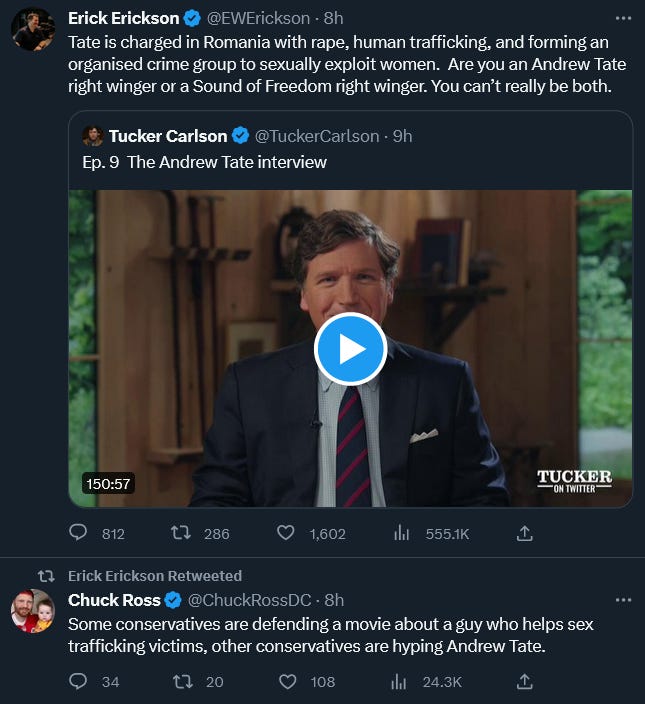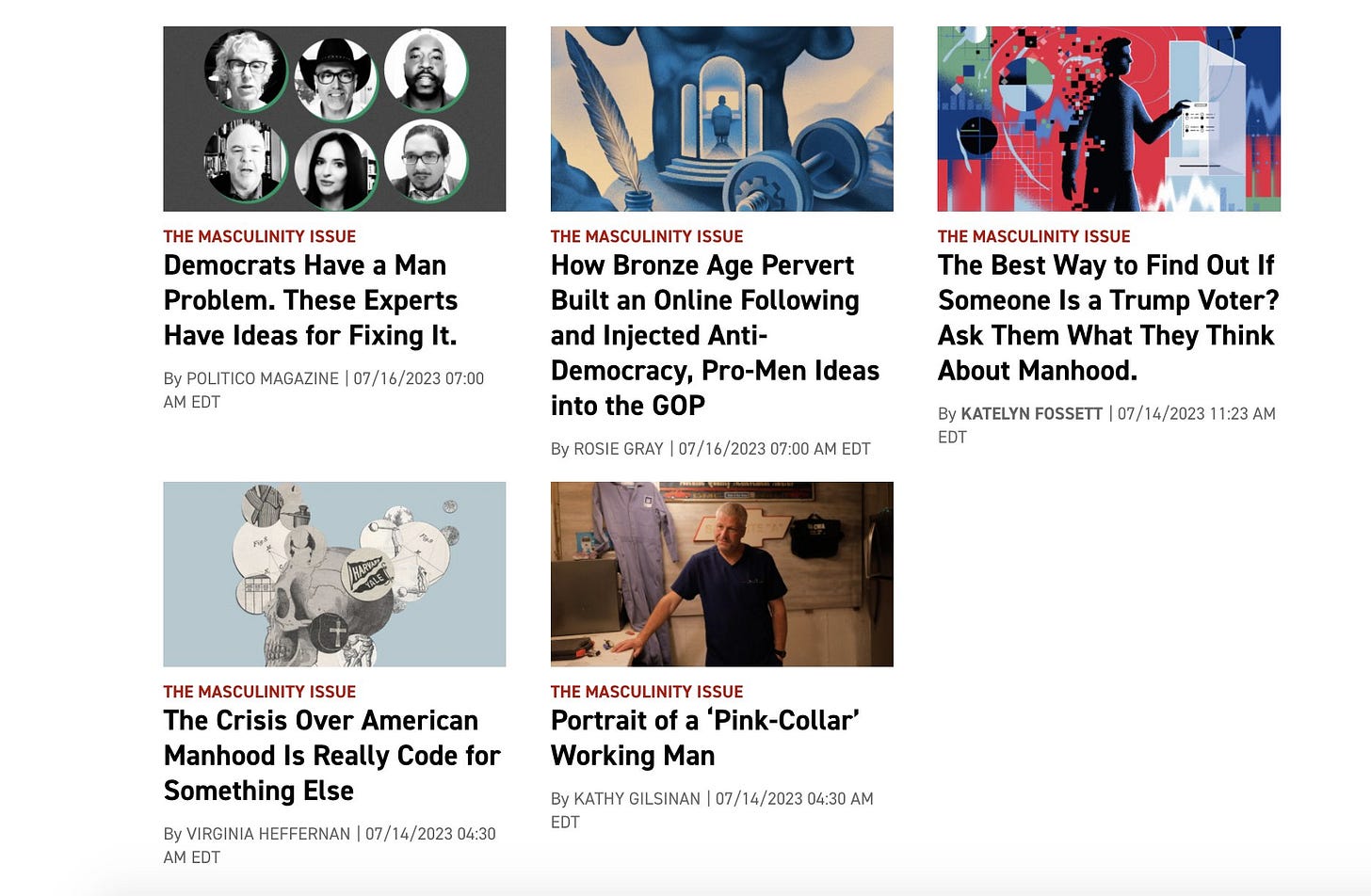The Conundrum of Andrew Tate for the Right
Masculinity is dimensional. The level of toxicity is a matter of degree and association with other behavioral and personality traits.
July 10 2023: The hand-wringing and pearl-clutching from both the left and the right over Tucker Carlson’s release of his interview with lightning rod, controversial celebrity media-influencer and accused rapist and human trafficker Andrew Tate as episode 9 of his Tucker on Twitter media series provides an important opportunity to make a few points regarding the concept of ‘masculinity’ and its larger relevance in what many—both pundits and professionals—have described as the feminisation of the West and American culture in particular.
Eschewing esoteric psychometric jargon, the point I wish to convey here is that masculinity, like its counterpart femininity, should be understood as a feature of personality that exists on a spectrum—from its complete absence to its most extreme levels—and that it does not exist in a vacuum, unrelated to other biological and behavioral traits (e.g., aggressiveness, dominance, etc.). That is, when you get masculinity (or femininity) you are going to get other personality and behavioral traits that are reliably associated with it (these reliable associations may arise for different reasons, such as biological sex, but the key point is that the trait correlations are reliably observed). For example, high levels of masculinity will probabilistically show positive associations of varying non-zero magnitudes with behavioral and personality traits such as aggression and (social) dominance.
This brings us to understanding a seeming paradox: how can someone like Andrew Tate who clearly possesses high levels of masculinity (read: ‘ultra masculinity’ in journalistic coverage), a personality trait conservatives and the Right have decried as being sanitized from an increasingly feminized Western culture and responsible for so much of what has gone wrong with young male mental health and cultural trends more broadly, be considered a politically problematic example to use as a spokesperson for what has gone wrong when he does in fact reflect a precise example of the missing element that has led to the problem?
The answer resides in a recognition that the behavioral disposition that makes him a precise exemplar of masculinity also tracks with other personality and behavioral traits that provide all the necessary grist for detractors to mark him as an example of 'toxic masculinity’ reflecting poor character, and a misogynist. Indeed, the criminal charges Tate currently faces in Romania, despite being described by some as very ‘flimsy’, only serves to reinforce this association for those who will immediately attack his character which is indeed cause for legitimate, reasonable concern. Indeed, this is not all that different from many of the same critiques of Donald Trump based on his behavior and comments (e.g., the now infamous comments Trump made to Billy Bush). Bret Weinstein recently summed up the issue at hand in the below tweet:
So, is this a prime example of hypocrisy from the right who are simultaneously promoting their noble conservative value framework and moral virtue by championing the clarion call for the protection of girls and women from transgender males posing as females and the recent film “Sound of Freedom” which draws attention to the social ill of child trafficking? Did Tucker commit an intellectual and moral gaffe by platforming Tate as a cause célèbre of the right? Some think so indeed. Jason Whitlock, a regular guest of Tucker’s on Tucker Tonight, recently described Tate as ‘more pimp than prophet’ in a recent Twitter Spaces. This video montage tweeted by Liz Wheeler and others is perhaps the best counterpoise to date I have seen that Tate is indeed (much) more malevolent than was reflected in his interview with Tucker. At minimum, the evidence presented in the video montage juxtaposed with Tate’s answers to Tucker’s interview questions leaves one wondering why Tucker did not challenge Tate much more strongly unless he was unaware of this information which strikes me as highly implausible. But, Tate rejoinded with his own ‘clarification’ video montage defending himself. And others reacted to the montage video with some skepticism, drawing—rightfully so—the distinction between the moral and the legal elements at the heart of the Tate discourse.
So where does that leave us in our analysis? My own views are mixed and have shifted more towards the view that positioning Tate—as Tucker did—as a cultural avatar for matters concerning the crisis of masculinity in contemporary Western culture was what might best be described as a ‘bad look.’ Keep in mind that Tucker has had harsh encounters with figures like Michael Avenatti, the convicted former attorney best known for his legal representation of adult film actress Stormy Daniels in lawsuits against then U.S. President Donald Trump, taking him to task for the same character and behavioral issues around exploitation of women that he goes light on Tate about. Other thinkers independently arrived at similar conclusion as mine above, including the always insightful Wesley Yang.
Nonetheless, as purely a matter of showcasing a strong masculine figure as symbolic of what has been lost in contemporary culture is not inaccurate. Morality aside, Tate does exemplify ‘masculinity.’ Where one personally draws the line between socially acceptable masculinity and unacceptable masculinity is primarily a value-judgement; where society has to adjudicate this issue is a legal one. Moreover, as I recently tweeted—and reflecting my oscillating views on the matter—as purely a matter of political statecraft during a time of intense political polarization when ‘politics is war’, which Tucker was clearly engaged in to some degree—
What is obvious from the above analysis is how difficult this issue is to adjudicate. Depending on one’s frame—and indeed one’s sex—reasonable cases can be made as to both whether Tucker should have selected him for an interview to push the masculinity agenda on the right and whether Tate does indeed reflect—for better and for worse—a core essence of masculinity that has been increasingly sanitized out of Western culture. Regarding the later, I think Tate does, but I also think Tucker should have selected another masculine archetype to highlight the very real problem he correctly identifies as ailing Western culture. This would have come at the cost of some political statecraft given Tate’s social media reach, but would have been the consistent thing to do given Tucker’s other views and statements about conservative values and the safeguarding of girls and women from sexual exploitation more generally. This issue is one of the most complex and challenging I have had to formulate a position around, albeit tentative one. It brings to mind a quote from director Alejandro González Iñárritu in describing the movie 21 Grams:
“a meditation that explores some of the things in our complex lives: loss, addiction, love, guilt, coincidence, vengeance, obligation, faith, hope, and redemption. I like multi-dimensional and contradictory characters, as I am and as, I guess, are all human beings that I know. No one is simply good or bad. We are just floating in an immense universe of circumstances. I like to show their weaknesses and strengths without judging, because only then can they reveal things about our human condition.”
I look forward to reader comments. I found those to my Twitter poll below informative and stimulating and they contributed to shaping my thinking this essay which I now must conclude.










I think this was fair. I agree that Tucker probably would have been better off picking someone else - but the potential virality of an interview with Tate, given the media attention surrounding his case and Tate's online following, may have proved irresistible. As for Tate himself, here are my views. After viewing a bunch of video material of him (links below for a good collection, IMO), I suspect Tate may be fairly high in psychopathic traits. He strikes me as adept at conning, his egotism is off the charts, he brags (whether truthfully or not is kind of irrelevant in this context) about his own criminal versatility (tax fraud, allusions to doing certain things when he was poor that are left to the listener's imagination, among others), he lies with ease even when caught in an obvious one, is never wrong (after all, he's the smartest person on the planet), and explains his loverboy method which is essentially a textbook description of the psychopathic lover (as Lobaczewski describes in Ponerology, but he's not the only one). A lot of that overlaps with Trump's narcissism, as you observed, but I can't help but get a much more malevolent vibe from Tate.
Videos:
https://www.youtube.com/watch?v=ihilUizlrUA
https://www.youtube.com/watch?v=bFuky6H5ysg
https://www.youtube.com/watch?v=iYLbNP4JuYs
It was interesting to see people flock to Tate quickly and defend him based on the perception that Tucker fostered that Tate is attacked for his pushback against toxic masculinity. Aligning with Tate so quickly without understanding much of his background was a good example of people being nudged to a conclusion.
Tate runs the chat rooms that creates the incels that he admonishes as loser, then sells a course to for the incel to clean himself up, “man” up and gain redemption. While this doesn’t make the charges in Romania true nor false, it does demonstrate his character. From that perspective it disqualifies him as an example to be revered. He was the flavor of the moment, Tucker capitalized on it, and the Tucker fans lined up an adopt Tate as a positive figure head.
The sad thing is that Tucker did nothing to probe the circumstances I listed above. Basic journalism. But good carnival show entertainment. Bu I think the conservatives missed an opportunity as well: if masculinity it about strength, then Tate is a weakling by exploiting people then using victimhood as a shield. It’s misdirection. I have a 19 year old son and the lesson I imparted to him re Tate “a real man builds and forges relationships, and doesn’t exploit.”